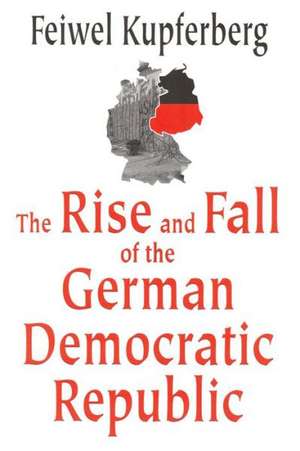The Rise and Fall of the German Democratic Republic
Autor Feiwel Kupferbergen Limba Engleză Hardback – 31 mar 2002
Preț: 766.85 lei
Preț vechi: 1028.97 lei
-25% Nou
Puncte Express: 1150
Preț estimativ în valută:
146.74€ • 153.59$ • 122.13£
146.74€ • 153.59$ • 122.13£
Carte tipărită la comandă
Livrare economică 31 martie-14 aprilie
Preluare comenzi: 021 569.72.76
Specificații
ISBN-13: 9780765801197
ISBN-10: 0765801191
Pagini: 240
Dimensiuni: 152 x 229 x 24 mm
Greutate: 0.6 kg
Ediția:New.
Editura: Taylor & Francis
Colecția Routledge
Locul publicării:Oxford, United Kingdom
ISBN-10: 0765801191
Pagini: 240
Dimensiuni: 152 x 229 x 24 mm
Greutate: 0.6 kg
Ediția:New.
Editura: Taylor & Francis
Colecția Routledge
Locul publicării:Oxford, United Kingdom
Cuprins
Preface and Acknowledgements, 1. Introduction: Cultural Studies, German History, and Moral Lessons 2. The Unmanaged Past: Rethinking the Inner Wall in Reunited Germany 3. Victors of History: The Smokescreen of Antifascism 4. The Workers’ and Peasants’ State: The Myth of the Marxist Utopia 5. Die Wende: Exit, Voice, and Collapse 6. The Dismantling of the GDR: Saving Careers and Legitimizing Biographies 7. The Elbow Society: East German Group Mentality and Cultural Alienation 8. Xenophobia and Right-Wing Extremism 9. When the World was Simple: GDR Nostalgia—A Return to Innocence 10. Conclusion: Nazi Germany, the GDR, and Inner Conflict
Descriere
Most public debate on reunited Germany has emphasized economic issues such as the collapse of East German industry, mass unemployment, career difficulties, and differences in wages and living standards













